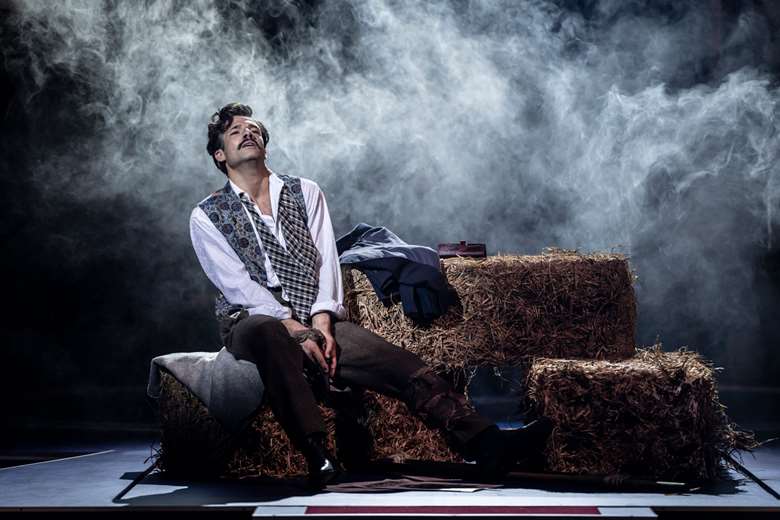Unlocking Sondheim's Musical Enigma
Edward Seckerson
Thursday, March 28, 2024
Stephen Sondheim never liked talking about his process and always considered the play to be the thing but Edward Seckerson debunks the notion that the late composer didn’t write ‘tunes’

I’m thinking back to a distant time in the 1970s when a good friend of mine returned from New York bearing a distinctively pink LP with the word Company emblazoned across it. I popped it on the deck and lowered the stylus to unlock the sound of afunky, twangy electric guitar and Hammond organ-like vamp. Then came the counterpoint of voices tossing the name Bobby back and forth. I’d never heard anything like it: it felt so irresistibly new and uncharted; it shouted sophistication and innovation. Mylove affair with Stephen Sondheim had begun.
I was an actor at the time working somewhere cold in the North East so the audacious theatricality was not lost on me. And then another friend gifted me an album with equally unforgettable artwork for a show called Follies and when the band first exploded to usher in Roscoe’s ‘Beautiful Girls’ the love affair became an obsession and the door was flung wide on aworld of Musical Theatre that Iinstinctively knew was both unique and enduring.
It was always the cumulative effect of the drama that preoccupied him… If we were to talk about music it was never his
But it puzzled me that someone this talented could make waves andyet still remain – commercially speaking– niche. His verbal dexterity and musical ingenuity were deemed too much for the general public’s taste. More disturbing still was the accusation at one time – from those (many of them critics) who should have known better – that Sondheim didn’t write ‘tunes’.
Tone deafness is a strange thing but in Follies there is a song called ‘In Buddy’s Eyes’, and in its final pages a blatant lie (which essentially the whole song is) isconsolidated in melody so rapturous that it still gives me goosebumps every time I hear it. Likewise the release of ‘Every Day a Little Death’ from A Little Night Music, or that moment in Passion where Giorgio stops resisting Fosca’s attentions and the power of unconditional love pours forth in perhaps the most impassioned pages of music Sondheim ever penned: ‘No One Has Ever Loved Me’. Can music like this really justpass people by?
In the recent revival of Assassins at Chichester, I was struck afresh by that moment in ‘The Ballad of Booth’ where John Wilkes Booth bares his soul before despatching himself to history. In a recent interview with Danny Mac, who played Booth in this revival, we discussed what is barely a couple of minutes of stage time in which Abraham Lincoln’s assassin proudly asserts and defends his actions. The words are disturbingly racist but Sondheim being Sondheim taps into Booth’s passion and again it’s the music that conveys it.
I was fortunate enough to meet Sondheim on many occasions but onething I could never successfully draw him onwas how his musical processes worked, how this orthat phrase might illuminate and amplify the words. He could talk endlessly about the placing and purpose of songs in his shows and his choice of styles, but getting him to open up about the musical aesthetics was nigh on impossible. It was always the cumulative effect of the drama that preoccupied him and if we were to talk music at all it was never his.
The best moments in Sondheim’s company always occurred after the recording device was switched off. He tended to grow restless and bored talking about himself ‘on the record’ but ‘off the record’ all bets were off and he might just as easily hold court about the latest plays on offer as wax lyrical about composers he revered. Like Ravel. Or Brahms. We argued once about which of the two Brahms Piano Concertos we preferred, and why – the First for me, the Second for him. And we were both crazy about Percy Grainger. I’ve often wondered why – but Ithink it had to do with Grainger’s delight in revisiting the same music in different guises. That initself was so very Sondheim.
But the play was always the thing for Sondheim. He honoured and respected his collaborators. Iknow for a fact that for the lastpublic interview he was scheduled to give (sadly he passed before it could happen) hehad elected to be interviewed by the playwright Tom Stoppard. Imagine acollaboration of any sort between those two. John Weidman (book writer on Assassins) told me once that when he handed Sondheim thefinal scene of Assassins, Sondheim said he had nothing to add. Nothing. No music. He was drawn to seemingly unworkable ideas (the puzzle syndrome) andhis final obsession with Luis Buñuel in the unfinished Here We Are (with writer David Ives) will doubtless remain something of an enigma. Might the musical absences in that final piece have remained absent? Perhaps…
This article originally appeared in the February/March 2024 issue of Musicals magazine. Never miss an issue – subscribe today







